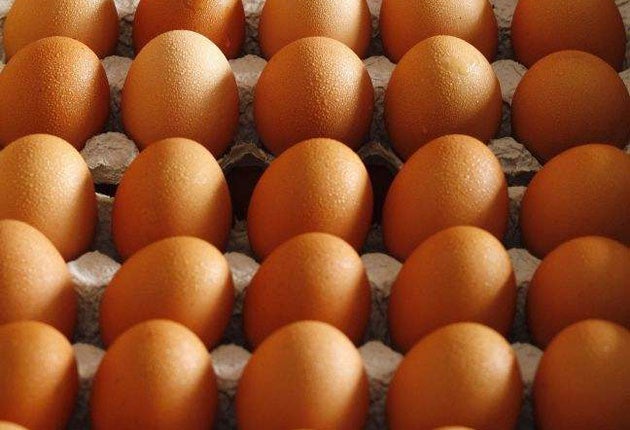Sainsbury's to ban battery eggs
Animal welfare groups welcome 'breathtaking' move by supermarket giant

Your support helps us to tell the story
From reproductive rights to climate change to Big Tech, The Independent is on the ground when the story is developing. Whether it's investigating the financials of Elon Musk's pro-Trump PAC or producing our latest documentary, 'The A Word', which shines a light on the American women fighting for reproductive rights, we know how important it is to parse out the facts from the messaging.
At such a critical moment in US history, we need reporters on the ground. Your donation allows us to keep sending journalists to speak to both sides of the story.
The Independent is trusted by Americans across the entire political spectrum. And unlike many other quality news outlets, we choose not to lock Americans out of our reporting and analysis with paywalls. We believe quality journalism should be available to everyone, paid for by those who can afford it.
Your support makes all the difference.Sainsbury's is to become the first of the Big Four supermarkets to end the sale of eggs from battery hens.
In a significant victory for poultry campaigners, Britain's third largest grocery chain will sell only eggs from uncaged birds from 5 February – three years before an EU-wide ban on battery cages comes into force.
Sainsbury's had been planning to phase out the sale of eggs from caged birds next year, but brought its decision forward to mark itself out from Asda, Tesco and Morrisons.
Rowen West-Henzell, of Compassion in World Farming, said: "We are over the moon that Sainsbury's has gone cage-free almost a year ahead of schedule. The scale of this move is breathtaking."
The move – which comes two weeks before Channel 4 updates viewers on Hugh Fearnley-Whittingstall's "Chicken Out" campaign to improve poultry welfare – will remove 500,000 birds a week from cages.
In the show, on 26 January, the River Cottage chef will disclose that sales of "higher welfare" meat chickens, including RSPCA, free-range and organic birds, have trebled from five to 15 per cent since he began his campaign in January 2008.
Separately, statistics released to The Independent by the market researchers TNS show that sales of free-range chickens rose throughout 2008 despite concerns that shoppers would ditch animal welfare during the financial downturn.
Several smaller supermarket chains such as Waitrose, Marks & Spencer and the Co-op have already removed eggs from caged birds from sale, but, with 16 per cent of the market, Sainsbury's has a bigger share than all of them combined.
Sainsbury's has also set a target to stop using caged eggs as an ingredient in its food and drink by 2012. Its "Taste the Difference" and "Kids" ranges already use only free-range eggs.
It was one of several retailers commended in Compassion in World Farming's first "good egg" awards on Monday. The group named companies making "significant progress" in improving welfare standards of hens. It also commended McDonald's, Starbucks, Marks & Spencer, Waitrose, Pret A Manger, JD Wetherspoon, The Eden Project in Cornwall and the catering at Microsoft UK and Google.
In his show, Fearnley-Whittingstall will show how the resolution he tabled at Tesco's AGM to improve its record on poultry farming won the support of small shareholders but was rejected by City institutions. Nonetheless, he said he was still pleased by the success of his campaign. He said yesterday: "We've effectively tripled the uptake of higher welfare chicken. But, if you look at it, 85 per cent of British chicken is still intensively farmed.
"We don't want to stop there. So our new programme isn't just an update, it's about taking the Chicken Out fight to another level. It's basically about taking on Britain's biggest retailer, Tesco, and trying to get it to change."
Fearnley-Whittingstall claimed that some top restaurant chefs secretly used intensively-farmed chickens. "I'm not going to give any names, but I know some chefs don't use free-range chicken," he said. "The sort of arrogance about it is that they think they're better than their ingredients. The sign of a great chef is to recognise that you're never better than your ingredients, and that if your ingredients are really good, you don't have to do a great deal to make the food great."
As a result of the EU legislation on battery cages, poultry farmers will be required to build larger "enriched" cages which give hens more space to move about. Sainsbury's will not be selling eggs from birds kept in these enriched cages.
Tesco and Asda, which have 48 per cent of UK grocery sales, both sell eggs from caged birds, while Morrisons is phasing out the sale of eggs from caged birds in its own label but still stocks another brand selling them.
Join our commenting forum
Join thought-provoking conversations, follow other Independent readers and see their replies
Comments